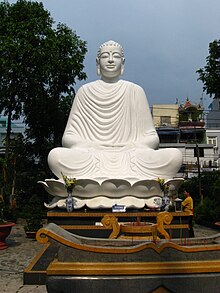You can help expand this article with text translated from the corresponding article in Chinese. (January 2025) Click for important translation instructions.
|

Ānantarya karma (Sanskrit) or Ānantarika kamma (Pāli) are the most serious offences in Buddhism that, at death, through the overwhelming karmic strength of any single one of them, bring immediate disaster. Both Buddhists and non-Buddhists must avoid them at all costs. Such offenses prevent perpetrators from attaining any of the stages of enlightenment and from ordaining into the Sangha. The offences are:
- Killing one's mother
- Killing one's father
- Killing an Arahant
- Wounding a Tathāgata
- Creating schism in the Sangha
Ānantarika kamma is considered so serious that even Amitabha Buddha abandoned all hope. His 18th Vow reads:
If I attain Buddhahood and a sentient being aspires with faith and joy to be reborn in my Sukhavati Pure Land: if they recite my name just ten times and, in spite of this, are not reborn there, then may I myself not attain enlightenment . Two exceptions to this solemn promise are in respect of, firstly, those who have committed the five terrible offences and, secondly, of those who have vilified the Sublime Dharma because such people cannot be reborn in Sukhavati.
— Amitabha Buddha
See also
- Ajatashatru
- Avijjā
- Buddhist views on sin
- Devadatta
- Icchantika
- Karma in Buddhism
- Merit (Buddhism)
- Moha (Buddhism)
- Pratitya-samutpada
- Samsara (Buddhism)
- Three Poisons
- Twelve Nidanas
References
- "SuttaCentral". SuttaCentral. Retrieved 2022-10-02.
- Gananath Obeyesekere (1990), The Work of Culture: Symbolic Transformation in Psychoanalysis and Anthropology, University of Chicago, ISBN 978-0-226-61599-8
- Walters, Jonathan S. (1990). "The Buddha's Bad Karma: A Problem in the History of Theravâda Buddhism". Numen. 37 (1): 70–95. doi:10.2307/3269825. JSTOR 3269825.
- Nakamura, Hajime (1991). Ways of Thinking of Eastern Peoples: India, China, Tibet, Japan. Motilal Banarsidass. p. 285. ISBN 978-8120807648.
- "The Sutra Preached by the Buddha on the Total Extinction of the Dharma". buddhism.org. Retrieved 10 January 2013.
- Nyanatiloka (1980), Buddhist Dictionary: Manual of Buddhist Terms and Doctrines, Buddhist Publication Society, ISBN 978-955-24-0019-3
- Triplegem glossary Archived 2006-12-28 at the Wayback Machine
- Creating a division in the Sangha / dividing the Sangha in terms of Buddhist beliefs
- "The Amitabha Sutra as discoursed by the Buddha" (PDF). Fo Guang Shan International Translation Center. 2017. Archived from the original (PDF) on 22 October 2022.
Further reading
- Silk, Jonathan A. (2007). Good and Evil in Indian Buddhism: The Five Sins of Immediate Retribution, Journal of Indian Philosophy 35 (3), 253–286